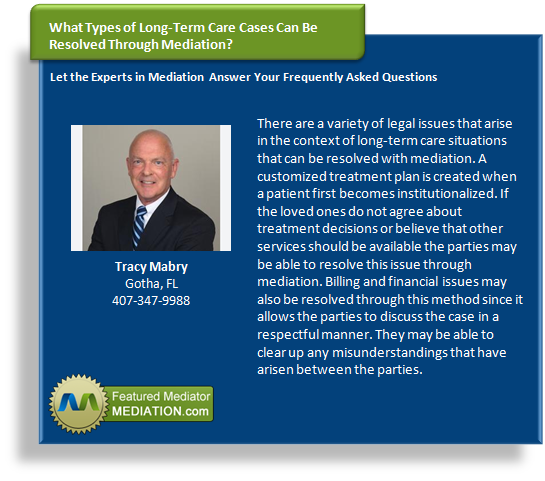The role of the attorney in preparing for and participating in a mediation differs from the attorney’s role in preparing for and participating in other facets of a litigation. This is so because the goals are different. The goal in a litigation is to win, however, that may be viewed in the context of the specific litigation. In contrast, the goal of a mediation is not to “win,” but rather to walk away with a negotiated agreement, which may very well be a “win” it is own right. In order to enhance the likelihood of achieving a negotiated agreement, the attorney may wish to consider doing the following in preparing for and participating in a mediation.
In preparing for the mediation the attorney should:
- Explain to their client the weaknesses in their case.
- Remind their client about the costs and uncertainties in proceeding with the litigation.
- Help their client deal with and diffuse the emotional component, if any, associated with the dispute.
- Involve their client in preparing the mediation statement to be submitted to the mediator.
- Discuss with their client the client’s expectations in connection with reaching a negotiated agreement.
- Discuss with their client the obstacles to reaching a negotiated agreement.
- Discuss with the mediator obstacles that may exist in connection with reaching a negotiated agreement.
At the mediation the attorney should:
- In the appropriate circumstances, encourage their client to speak.
- During the joint session, the attorney should factually present their clients’ case.
- Following the attorney’s opening statement presenting their clients’ case, the attorney should modify their role and move away from being an advocate towards becoming a deal maker.
In preparing for mediation, the attorney should explain to their client the weaknesses in their case. In some circumstances, this may be the first time that the attorney has a frank conversation with their client about the weaknesses in the case. During preparation for the mediation, the client should also be reminded about the costs and uncertainties in proceeding with the litigation[1].
During these discussions, the attorney should address what their client would like to achieve in a negotiated agreement and what their client believes are the obstacles, if any, to reaching a negotiated agreement. Having the client express their desires and obstacles are important, because if the client’s desires are not met and the obstacles not overcome, a negotiated agreement will not be reached. Furthermore if the clients’ desires or obstacles to settlement are unrealistic, this will give the attorney the opportunity to begin the process of addressing the unrealistic expectations of the client, which process will certainly continue at the mediation.
In preparation for the mediation, it is also important for the attorney to help their client deal with and diffuse the emotional component, if any, associated with the dispute that has resulted in the litigation. The attorney can assist their client in this regard by showing empathy for what has occurred and simultaneously discussing with their client the practicalities, costs and uncertainties associated with the litigation and the benefits of reaching a negotiated settlement.
My view is that the time spent on discussing settlement and settlement options in preparation for an upcoming mediation is time very well spent. It is more likely to achieve a negotiated agreement at a mediation if there have been frank and open conversations between the attorney and their client prior to the mediation which tackle the benefits of settlement and explore and structure various settlement options and/or proposals. The benefits of settlement that should be discussed with the client include the following:
- the client will control the end result, rather than it being left to a judge or jury, resulting in reducing the uncertainty;
- the continued costs of the litigation will be eliminated; and
- the parties will be able to move forward with their businesses and their lives, including not having to spend anymore of their time involved in the litigation. In preparing for the mediation, it is very useful to prepare a mediation statement to give to the mediator in advance of the mediation. This serves several functions. It helps the attorney and the client analyze their case. Most mediation statements presented to the mediator only reflect the strength of your client’s position and do not reflect the weaknesses. Although it is uncommon, assuming the mediation statement is submitted confidentially, pointing out the weaknesses of your case to the mediator is often a good idea.
Realistically, there is not a single case that has been litigated that does not have weaknesses, so there is no reason to pretend that your case is any different. The attorney should involve their client in the preparation and review of the mediation statement and elicit the clients’ input. This is important not only because the client may know things about the case that the attorney does not even know, which is particularly true in a case that is mediated early, but also because it invests the client in the mediation process and helps focus the client on settlement alternatives in contrast to litigation strategies. In addition, the attorney should discuss with the mediator, prior to the mediation, obstacles that the attorney perceives exist in connection with reaching a settlement at the mediation. The mediator will be interested and appreciative in hearing about the obstacles prior to the mediation and it will also provide the mediator with the opportunity to consider approaches to be used at the mediation to overcome them.
In participating at the mediation, the attorney and the client’s roles are often times much different than at trial. At mediation, assuming that there is a joint session or sessions with the mediator, the attorneys and all the respective parties, then both the attorneys and the parties should feel free to speak. In my view, if the parties are comfortable speaking, then it is quite beneficial to let them speak and I suggest that the attorney’s encourage their client’s to speak. The parties speaking gives them an opportunity to say what is on their mind and in their heart, not in a technical sense but on a human level, we have all heard stories that cases sometimes settle by just having one of the parties hear an apology from the other party. Even if it is not that simple, which oftentimes it is not, having the parties speak at the mediation, both in the joint sessions and the caucuses, is nevertheless quite beneficial. Ultimately, if a case settles at a mediation, it is because the parties were willing to settle. If the parties speak at the mediation, they feel as though they have participated in the process and have expressed their desires and wishes and they are more likely to be agreeable to a settlement.
The attorney’s role in the joint session should be to present factually and unemotionally their client’s position. This is useful for a number of reasons. Probably the most important reason for this is to have the opposing party hear your client’s position. The opposing party may have never heard it because the information that they are receiving has been filtered by their own attorney. There are also benefits in having the mediator hear the opening statements, even in the case where the mediator has received a mediation statement in advance, and more importantly, in the case where a mediator has not received the mediation statement in advance. The mediator hearing the respective positions and observing the parties reactions provides the mediator with additional insights. During the separate caucuses, the attorney should be interacting with their client. In this regard, if the mediator is caucusing with the other side the attorney should use this time to privately discuss with their client the information that has been imparted to them by the mediator in connection with the private caucus the mediator previously had with the other side and what impact this information has on their own case and on reaching a negotiated agreement.
If the separate caucus session is one in which the mediator is with the attorney and their client, then the attorney should let the mediator lead the discussions and if the attorney has any questions, the attorney should ask them and the attorney should encourage their client to ask questions of the mediator and to interact with the mediator. Once again, it is more beneficial to have the client interact directly with the mediator to facilitate a settlement agreement.
During the mediation, the attorney should consider, under the appropriate circumstances, suggesting that the principals (i.e. the parties) meet privately in an attempt to reach a tentative agreement leading to a formal settlement. This technique may prove enormously valuable, particularly when you have sophisticated parties and the dispute is not emotionally charged. After all, it is the parties who settle cases and not the attorneys, nor the mediator.
–By Marc I. Sinensky,
Marc Sinensky has approximately 35 years experience in complex transactional matters and complex commercial litigation and is a Florida Supreme Court Certified Circuit Civil Mediator and a Florida Supreme Court Certified Family Mediator. The opinions expressed are those of the authors and do not necessarily reflect the views of the firm, its clients, or Portfolio Media Inc., or any of its or their respective affiliates. This article is for general information purposes and is not intended to be and should not be taken as legal advice.
[1] Where the attorney is representing the plaintiff, the conversations should include discussions about the risks and difficulties associated with proving both liability and damages and collecting on a damage award, if they prevail. Where the attorney is representing the defendant, the conversations should focus upon the risks associated with a judge or a jury coming in with an unexpected large verdict. The point to emphasize to your client is that there are enormous uncertainties in leaving the outcome to others if the parties do not reach a negotiated agreement.
All Content © 2003-2012, Portfolio Media, Inc.
Sinensky Mediation
www.sinenskymediation.com







